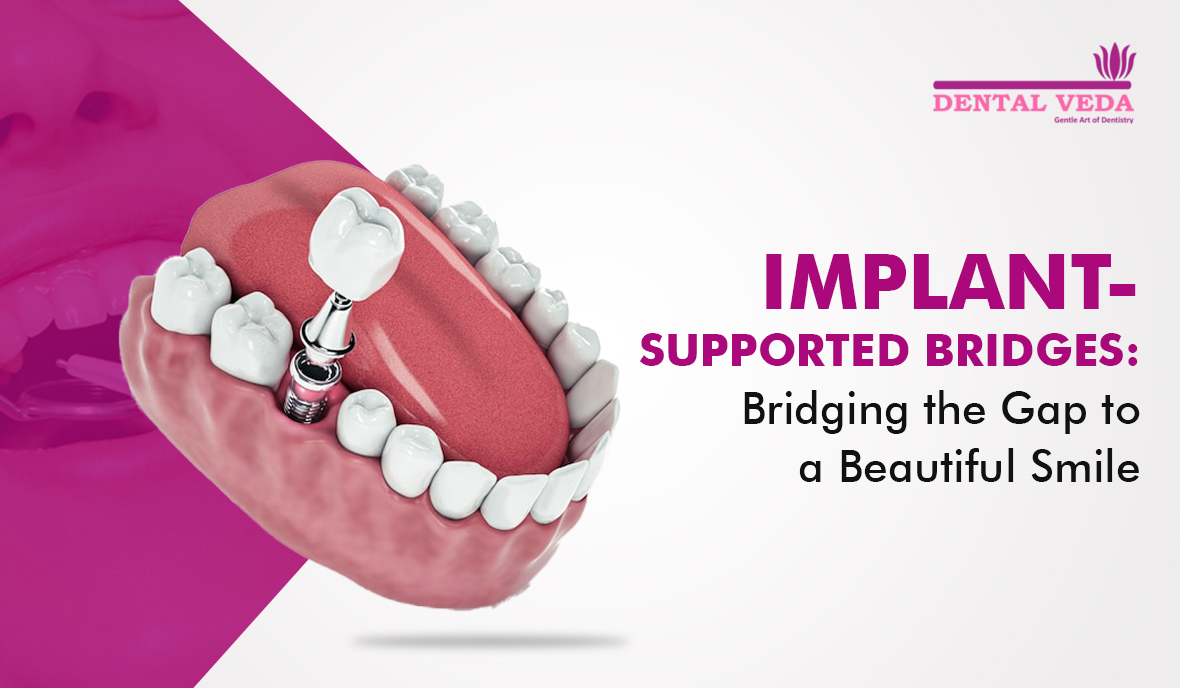A beautiful smile holds incredible power. It radiates confidence, boosts self-esteem, and creates a positive first impression. However, missing teeth can have a significant impact on both our appearance and overall well-being. They can cause feelings of inferiority, affect our ability to speak clearly and chew comfortably, and even lead to bone loss and facial sagging over time. By addressing the issue of missing teeth with implant-supported bridges, we can regain a complete smile and the confidence and quality of life that comes with it.
Implant-supported bridges are a remarkable dental solution that bridges the gap in your smile, restoring both aesthetics and functionality. Unlike traditional bridges, which rely on adjacent teeth for support, implant-supported bridges are anchored securely into the jawbone using dental implants. This innovative approach ensures a stable and long-lasting solution for replacing missing teeth.
Let us know more about them.
Understanding Implant-Supported Bridges
Implant-supported bridges are dental prosthetics that replace multiple missing teeth by utilizing dental implants as anchors. Dental implants are small titanium posts surgically placed into the jawbone, serving as artificial tooth roots. These implants fuse with the bone through a process called osseointegration, providing a sturdy foundation for the bridge. The bridge, consisting of artificial teeth, is then securely attached to the implants, restoring the missing teeth’ appearance and functionality.
Implant-supported bridges offer several advantages over traditional bridges:
Preservation of adjacent teeth: Unlike traditional bridges, implant-supported bridges do not rely on adjacent natural teeth for support. This means that healthy teeth do not need to be filed down or altered to accommodate the bridge, preserving their integrity.
Enhanced stability and durability: Dental implants provide a strong and stable support system for the bridge, preventing slippage or movement while speaking or eating. Implant-supported bridges are known for their exceptional longevity, often lasting a lifetime with proper care.
Improved jawbone health: The underlying jawbone may deteriorate over time when a tooth is lost. Dental implants in implant-supported bridges stimulate the jawbone, preventing bone loss and maintaining the natural shape and structure of the face.
Implant-supported bridges are typically made from durable and biocompatible materials:
Dental implants: The implants are usually made of titanium, which is well-tolerated by the body and integrates effectively with the jawbone.
Artificial teeth: The artificial teeth in the bridge are typically made from materials like porcelain or zirconia, which closely resemble the appearance and strength of natural teeth. These materials are resistant to staining and provide a lifelike aesthetic.
Connectors and abutments: The connectors and abutments that attach the bridge to the implants are usually made of high-quality metals like titanium or gold alloy, ensuring durability and stability.
The Process of Getting Implant-Supported Bridges
Initial consultation and evaluation process:
The process begins with an initial consultation with a dental professional experienced in implant dentistry. During the consultation, the dentist will assess your oral health, evaluate your jawbone and remaining teeth condition, and discuss your goals and expectations. X-rays, 3D scans, or impressions may be taken to gather detailed information about your jawbone structure and to plan the implant placement.
Dental implant placement procedure:
The next step involves the surgical placement of the dental implants. This is typically done under local anesthesia to ensure your comfort.
A small incision is made in the gum tissue, exposing the underlying jawbone.
The dentist then carefully drills a small hole into the jawbone and inserts the titanium implant post into it. Multiple implants may be placed depending on the number of missing teeth to be replaced.
After the implants are placed, the gum tissue is sutured back in place, and a healing period of a few months begins. During this time, the implants undergo osseointegration, fusing with the jawbone to provide a solid foundation.
Attaching the bridge to the implants:
Once the healing period is complete, a second minor surgery may be performed to expose the tops of the implants, creating access for attaching the bridge.
Impressions of your mouth are taken to create a customized bridge that matches your natural teeth in color, shape, and size.
The bridge, consisting of artificial teeth, is then attached to the implants using connectors or abutments.
The dentist ensures a proper fit and bites alignment, making necessary adjustments if needed.
Having the bridge placed will restore your smile’s function and aesthetics.
Advantages of Implant-Supported Bridges
Stability and security:
Implant-supported bridges offer exceptional stability and security compared to traditional removable dentures or bridges.
The dental implants act as artificial tooth roots, firmly anchoring the bridge in place, preventing slippage, and providing a secure fit.
This stability allows you to speak, eat, and laugh with confidence without worrying about the bridge shifting or becoming loose.
Natural look and feel:
Implant-supported bridges closely resemble natural teeth in both appearance and function. The artificial teeth in the bridge are customized to match your natural teeth’ color, shape, and size, creating a seamless and natural-looking smile. Because the bridge is securely attached to the implants, it feels like having your own teeth, providing a comfortable and familiar sensation.
Improved functionality:
Implant-supported bridges significantly enhance the functionality of your mouth, allowing for better chewing and speaking abilities. The stability provided by the implants allows you to enjoy a wide range of foods without restrictions, improving your dietary choices and overall nutrition. By replacing missing teeth, implant-supported bridges help maintain proper alignment of the remaining teeth, preventing issues with bite alignment and jaw joint problems. They also promote better oral health by reducing the risk of bone loss and gum recession associated with missing teeth, preserving the overall integrity of your oral structures.
Long-Term Benefits and Maintenance
Long-term success and durability of implant-supported bridges:
Implant-supported bridges have a high success rate and can last a lifetime with proper care and maintenance.
Dental implants used in implant-supported bridges are made from durable materials like titanium, known for their strength and biocompatibility.
With proper osseointegration and good oral hygiene, implants provide a stable foundation for the bridge, ensuring its long-term stability and durability.
Importance of proper oral hygiene and regular dental visits:
Maintaining good oral hygiene is crucial for the long-term success of implant-supported bridges.
Regular brushing and flossing help prevent plaque buildup around the bridge and implants, reducing the risk of gum disease and implant-related complications.
Following the dentist’s recommendations for oral care specific to your implant-supported bridge is essential, such as using special floss or interdental brushes to clean around the implants.
Regular dental visits allow your dentist to monitor your implants’ health, assess the bridge’s condition, and promptly address any concerns or issues.
Potential for adjustments or replacements in the future:
While implant-supported bridges are highly durable, adjustments or replacements may be necessary in the future due to normal wear and tear. Over time, the artificial teeth in the bridge may experience natural wear, and the connectors or abutments may need to be replaced or tightened. Regular dental check-ups allow the dentist to evaluate the condition of your implant-supported bridge and make any necessary adjustments or replacements to ensure its optimal function and longevity.
Dental Veda: Crafting Smiles that Last with Implant-Supported Bridges!
If you are dealing with missing teeth, implant-supported bridges are a remarkable solution to consider. They go beyond traditional bridges, preserving adjacent teeth and providing unmatched stability. You can regain a complete smile and restore your confidence by choosing implant-supported bridges.
For more information, contact one of the best dental clinics in Gurgaon.


